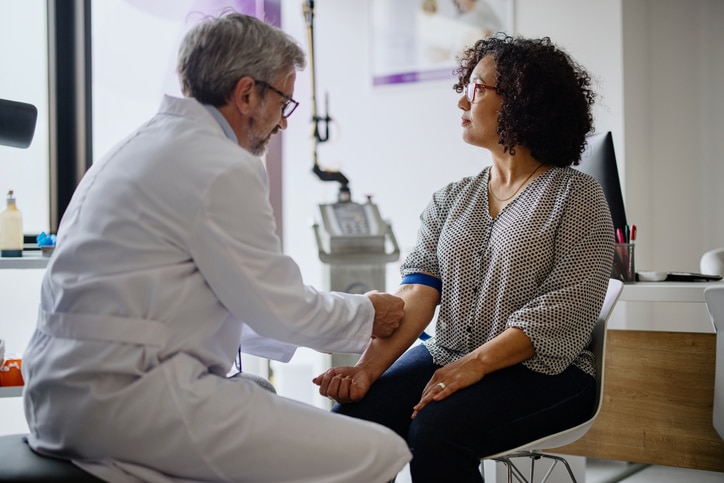Hot flashes and night sweats torment millions of women in menopause, and relief was once elusive for those who can’t or don’t want to receive hormone replacement therapy.
That changed this summer when the Food and Drug Administration approved a new drug to treat hot flashes — the first non-hormonal treatment of its kind.
“The first thing that comes to mind is how this will help patients who can’t take estrogen,” says William Salter, MD, OB-GYN on the medical staff at Methodist Richardson Medical Center.
Dr. Salter says the prescription medication, fezolinetant (brand name Veozah), could be a game-changer for these women.

WHY IT MATTERS
The new drug shows that researchers are searching for solutions to a problem that affects millions of people. About 85% of women going through menopause experience these intense bouts of overheating, sweating, and flushing, according to the Journal of Mid-Life Health.
What happens before and during menopause — which generally occurs to women in their 40s and 50s — is a drop in certain hormones like estrogen, Dr. Salter explains. Estrogen influences the hypothalamus, which is in charge of regulating body temperature, so a reduction in its production will cause the system to go haywire.
“Basically, the less estrogen you have, the more hot flashes you’ll experience,” he says. “Hot flashes and night sweats can affect women as they approach, transition, and complete menopause. These symptoms can be so severe as to interfere with their daily life.”
Traditionally, physicians have prescribed hormone replacement therapy as a way to help women cope. But that’s not always an option — such as in the cases of women diagnosed with breast cancer. Prioritizing research of more alternatives like fezolinetant would be of tremendous benefit to them, Dr. Salter says.
“Estrogen can increase the risk of recurrence for some types of breast cancer, so having medications like this — which have nothing to do with hormones, but still treat the root cause of the hot flashes — is going to be much better for these patients,” he says.

OTHER REMEDIES
Treating menopause symptoms with drugs isn’t groundbreaking, but before now physicians have resorted to prescribing medications beyond their intended use. In the past, doctors have tried antidepressants, a nerve pain drug, and a blood pressure medication to help patients manage hot flashes as an off-label use, Dr. Salter says.
Only time and more data will tell how this new drug stacks up against more established medications, he adds.
Still, some women might want to avoid medical intervention altogether and take a more homeopathic approach. Previously, doctors have recommended meditation and other mind-body techniques, as well as lifestyle changes like losing weight or adjusting your diet.
“You can try avoiding spicy foods or eating more soy products,” Dr. Salter suggests. “Soy has some natural estrogen in it, so you might get some relief that way.”

CONSIDER OPTIONS
While fezolinetant might have potentially positive impacts, it’s not without a list of warnings and adverse side effects, including abdominal pain, diarrhea, insomnia, and back pain. The drug can also cause liver and kidney problems, so it’s not for everyone.
“Liver screening blood tests are needed before starting and while using fezolinetant to evaluate liver enzyme levels,” Dr. Salter said. “This is not for patients with cirrhosis, severe kidney problems, or renal failure.”
There’s also a notable lack of data surrounding people who are older than 65. People who are taking other medications should also be wary since different drugs interact with each other in various ways, Dr. Salter cautioned.
“The bottom line is if you think this will help and believe it fits your health profile, it’s worth a discussion with your physician,” Dr. Salter says.






